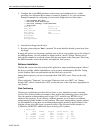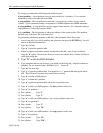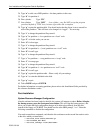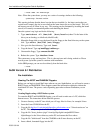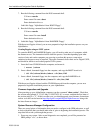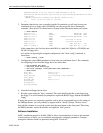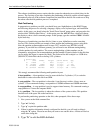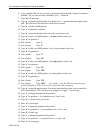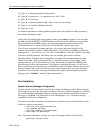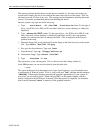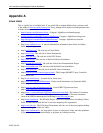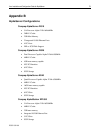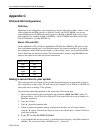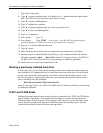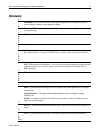
Linux Installation and Configuration Guide for AlphaServer 80
ECG513/0100
7. Type “m” for more help.
8. Type “p” to print the partition table. You should see a “c” partition that takes up the whole
disk. This will have to be removed to install Linux correctly
9. Type “d” to delete a BSD partition
10. Type “c” to delete the c partition
11. Type “p” to print the partition table and verify no partitions exist
12. Type “n” to add a new BSD partition
13. Type “a” for partition a.
14. First cylinder: Type “3”.
15. Last cylinder: Type “17365” ; last cylinder - one. Do NOT accept the program
generated default of "17366" here, because of possible disk corruption).
16. Type “w” to write the disklabel to the disk.
17. Type “q” to quit.
18. Please shutdown the system in order to recognize the new partition on a second drive.
19. Once the system as rebooted and the user has log in, open a terminal window and issue the
following command; # mkfs /dev/TdZ1 (where T is the type of drive, s for SCSI or h
for IDE; and Z is the letter of the drive you are booting; ex: dka0=sda, dqa0=hda)
20. The device is now ready to be mounted by the OS.
Reusing a previously installed hard drive
In some rare cases, you may find yourself needing to install onto a disk drive that has previously
been installed to. It is important that you re-create the boot records on the drive. If you followed
the rest of the instructions in this manual, you will have allocated the first three sectors of the
drive for this purpose. Assuming that is the case, you can destroy the contents of those sectors
prior to installing, using this command:
dd if=/dev/zero of=/dev/TdZ count=2 bs=512
where T is the type of drive, s for SCSI or h for IDE; and Z is the letter of the drive you are using;
ex: dka0=sda, dqa0=hda.
TLZ07 and TLZ09 Errata
Problems have been observed when trying to install to systems that have TLZ07 and TLZ09 tape
devices installed. Specifically, when booting from the floppy, the system will hang during the
SCSI probe phase of the boot process. The suggested work around is to power down the system,
remove the power plug from the tape device, and then repower and boot the system. After the
system has been installed, you can reconnect the tape device.



